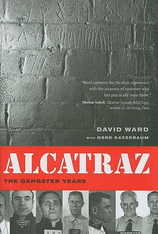New from the University of California Press:
Alcatraz: The Gangster Years by David Ward with Gene Kassebaum.
 About the book
About the book, from the publisher:
Al Capone, George "Machine Gun" Kelly, Alvin Karpis, "Dock" Barker—these were just a few of the legendary "public enemies" for whom America's first supermax prison was created. In Alcatraz: The Gangster Years, David Ward brings their stories to life along with vivid accounts of the lives of other infamous criminals who passed through the penitentiary from 1934 to 1948. Ward, who enjoyed unprecedented access to FBI, Federal Bureau of Prisons, and Federal Parole records, conducted interviews with one hundred former Alcatraz convicts, guards, and administrators to produce this definitive history of "The Rock." Alcatraz is the only book with authoritative answers to questions that have swirled about the prison: How did prisoners cope psychologically with the harsh regime? What provoked the protests and strikes? How did security flaws lead to the sensational escape attempts? And what happened when these "habitual, incorrigible" convicts were finally released? By shining a light on the most famous prison in the world, Ward also raises timely questions about today's supermax prisons.
 About the book, from the publisher:
About the book, from the publisher:





























